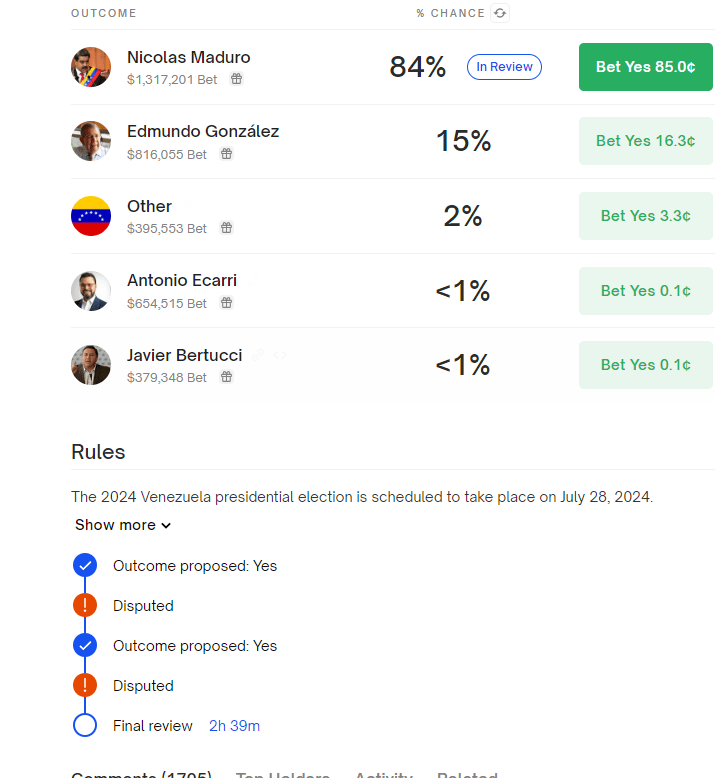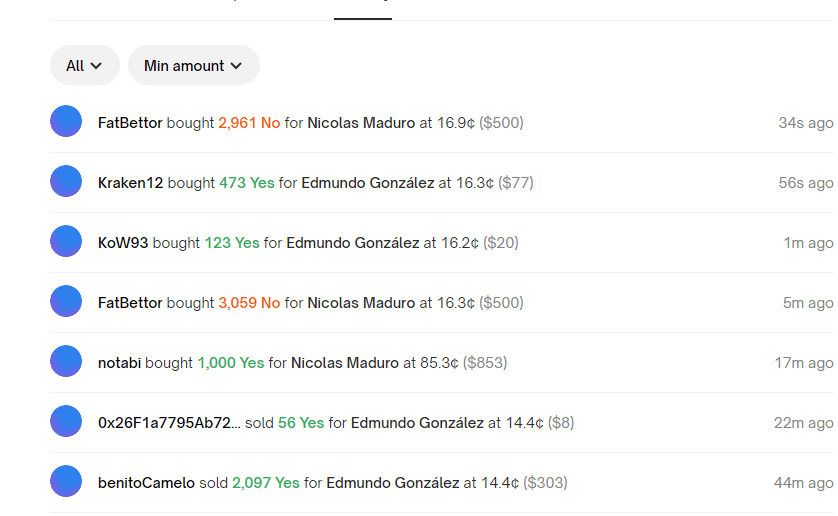A brief followup to this post in light of recent events.
Free and Fair Elections
Polymarket has an open market 'Venezuela Presidential Election Winner'. Its description is as follows:
The 2024 Venezuela presidential election is scheduled to take place on July 28, 2024.
This market will resolve to "Yes" if Nicolás Maduro wins. Otherwise, this market will resolve to "No."
This market includes any potential second round. If the result of this election isn't known by December 31, 2024, 11:59 PM ET, the market will resolve to "No."
In the case of a two-round election, if this candidate is eliminated before the second round this market may immediately resolve to "No".
The primary resolution source for this market will be official information from Venezuela, however a consensus of credible reporting will also suffice.
Can you see any ambiguity in this specification? Any way in which, in a nation whose 2018 elections "[did] not in any way fulfill minimal conditions for free and credible elections" according to the UN, there could end up being ambiguity in how this market should resolve?
If so, I have bad news and worse news.
The bad news is that Polymarket could not, and so this market is currently in a disputed-outcome state after Maduro's government announced a more-official-but-almost-certainly-faked election win, while the opposition announced somewhat-more-credible figures in which they won.
The worse news is that $3,546,397 has been bet on that market as of this writing.
How should that market resolve? I am not certain! Commenters on the market have...ah...strong views in both directions. And the description of the market does not make it entirely clear. If I were in charge of resolving this market I would probably resolve it to Maduro, just off the phrase about the 'primary resolution source'. However, I don't think that's unambiguous, and I would feel much happier if the market had begun with a wording that made it clear how a scenario like this would be treated.
(Update 8/2: market is still unresolved, Maduro trading at 75%).
(Update 8/5: market still unresolved, Maduro trading at 57%).
(Update 8/6: the market, with $6.15M bet, has resolved to opposition candidate Edmundo Gonzales)
How did other markets do?
I've given Manifold a hard time on similar issues in the past, but they actually did a lot better here. There is a 'Who will win Venezuela's 2024 presidential election' market, but it's clear that it "Resolves to the person the CNE declares as winner of the 2024 presidential elections in Venezuela" (which would be Maduro). There are a variety of "Who will be the president of Venezuela on [DATE]" markets, which have the potential to be ambiguous but at least should be better.
Metaculus did (in my opinion) a bit better than Polymarket but worse than Manifold on the wording, with a market that resolves "based on the official results released by the National Electoral Council of Venezuela or other credible sources," a description which, ah, seems to assume something about the credibility of the CNE. Nevertheless, they've resolved it to Maduro (I think correctly given that wording).
On the other hand, neither of these markets had $3.5M bet on them. So.
What does this mean for prediction markets?
This is really nowhere near as bad as this can get:
- Venezuelan elections are not all that important to the world (sorry, Venezuelans), and I don't think they get all that much interest compared to other elections, or other events in general. (Polymarket has $3.5M on the Venezuelan election. It has $459M on the US election, $68M on the US Democratic VP nominee, and both $2.4M on 'most medals in the Paris Olympics' and $2.2M on 'most gold medals in the Paris Olympics').
- Venezuela's corruption is well-known. I don't think anyone seriously believes Maduro legitimately won the election. I don't think it was hard to realize in advance that something like this was a credible outcome. There is really very little ambiguity about the actual nature of reality here!
- Venezuela is sufficiently dictatorial that all 'official sources' are likely to announce the same thing. There isn't likely to be e.g. disagreement between two different parts of the Venezuelan government on who won the election.
How would current prediction markets do in the 2000 Bush-Gore US election? Or, more to the point, how will they do the next time something even slightly unexpected happens, when it turns out that their wording did not quite predict it?
And when that inevitably happens, will there be tens of millions of dollars invested in the question?
I don't support e.g. the CFTC decision to try to ban prediction markets entirely. I think prediction markets are a potentially interesting tool. But seeing things like this happen (over and over) makes me less and less optimistic about prediction markets as a way to resolve questions that are even slightly complicated or controversial. And if you want prediction markets used broadly as a way of getting trustworthy information on complicated issues, I think you need to realize this as a major problem.


I agree that most markets resolve successfully, but think we might not be on the same page on how big a deal it is for 5% of markets to end up ambiguous.
If someone offered you a security with 95% odds to track Google stock performance and 5% odds to instead track how many hairs were on Sundar Pichai's head, this would not be a great security! A stock market that worked like that would not be a great stock market!
In particular:
This also makes Manifold's preferred strategy of dealing with ambiguity by N/A-ing a market less valuable: that's an acceptable resolution for someone who just did buy-and-hold on that one market, but can be very bad for someone who was trading actively across multiple markets some of which N/A-ed and some of which did not.
This imagines a world where prediction markets are major enough and mainstream enough for people to be looking at them and talking about them: but that's exactly what prediction market advocates want!